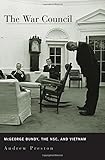The war council : McGeorge Bundy, the NSC, and Vietnam / Andrew Preston.
Material type: TextPublication details: Cambridge, Mass. : Harvard University Press, (c)2006.Description: 1 online resource (xi, 320 pages)Content type:
TextPublication details: Cambridge, Mass. : Harvard University Press, (c)2006.Description: 1 online resource (xi, 320 pages)Content type: - text
- computer
- online resource
- 9780674056800
- DS558 .W373 2006
- COPYRIGHT NOT covered - Click this link to request copyright permission: https://lib.ciu.edu/copyright-request-form
- digitized 2010 HathiTrust Digital Library committed to preserve
| Item type | Current library | Collection | Call number | URL | Status | Date due | Barcode | |
|---|---|---|---|---|---|---|---|---|
 Online Book (LOGIN USING YOUR MY CIU LOGIN AND PASSWORD)
Online Book (LOGIN USING YOUR MY CIU LOGIN AND PASSWORD)
|
G. Allen Fleece Library ONLINE | Non-fiction | DS558 (Browse shelf(Opens below)) | Link to resource | Available | ocn658218854 |
Browsing G. Allen Fleece Library shelves, Shelving location: ONLINE, Collection: Non-fiction Close shelf browser (Hides shelf browser)
Includes bibliographies and index.
The mentor: Stimson's influence on Bundy-- A foreign office in microcosm: creating the National Security Adviser and re-creating the NSC staff -- Learning to fear the bomb: Kennedy's crises and the origins of detente -- The hawk: Rostow and the first attempt at Americanization -- The soft hawk: Forrestal and nonmilitary escalation -- Bundy the adviser: the drift to war -- Bundy the advocate: the rush to war -- Bundy ambivalent: rolling thunder, student unrest, and the decision to commit troops -- Bundy resilient: the bombing pause and the continuing search for a successful policy -- Legacies.
COPYRIGHT NOT covered - Click this link to request copyright permission:
https://lib.ciu.edu/copyright-request-form
Master and use copy. Digital master created according to Benchmark for Faithful Digital Reproductions of Monographs and Serials, Version 1. Digital Library Federation, December 2002. MiAaHDL
http://purl.oclc.org/DLF/benchrepro0212
digitized 2010 HathiTrust Digital Library committed to preserve pda MiAaHDL
"Was the Vietnam War unavoidable? Historians have long assumed that ideological views and the momentum of events made American intervention inevitable. By examining the role of McGeorge Bundy and the National Security Council, Andrew Preston demonstrates that policymakers escalated the conflict in Vietnam in the face of internal opposition, external pressures, and a continually failing strategy." "In challenging the prevailing view of Bundy as a loyal but quietly doubting warrior, Preston also revises our understanding of what it meant - and means - to be a hawk or a dove. The War Council is a story with two inseparable themes: the acquisition and consolidation of power; and how that power is exercised."--Jacket.
There are no comments on this title.






